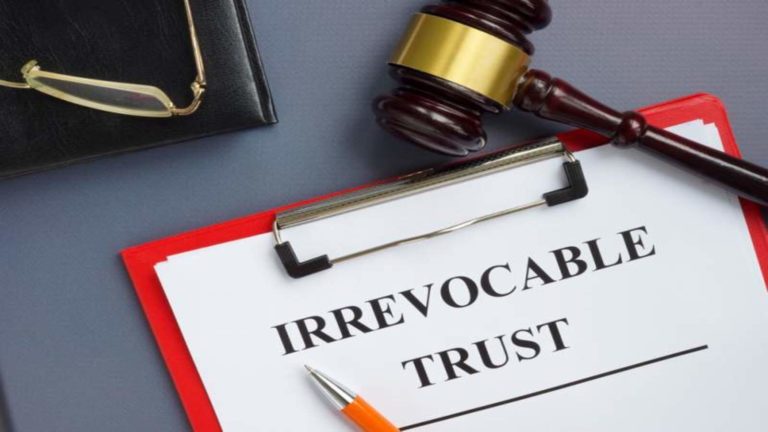Whether you inherited a house or chose to place it in an irrevocable trust at some point in your life, this might be one of the many questions in your mind. The short answer is that yes, you can sell a house in an irrevocable trust. However, what happens to the profits will depend on the terms mentioned in your trust agreement.
In this article, we will walk you through the various aspects of an irrevocable trust and how to sell a house included in this arrangement as smoothly as possible.

1. What Is An Irrevocable Trust?
As it is clearly evident from the name, an irrevocable trust is a trust that cannot be amended, modified, revoked, or even dissolved once brought into existence. Since no detail about the trust cannot be changed after the agreement is sealed, it holds a solid background and offers the greatest protection for your assets. This is one reason why most people who consider their home as their greatest asset choose to place in it an irrevocable trust.
An irrevocable trust doesn’t take away all your rights or control over the property. You get to enjoy some level of freedom and choices, such as:
- Changing the trustee
- Adding and removing beneficiaries
- Adding and removing properties from the trust
- Disinheriting a beneficiary from the trust
Nonetheless, you won’t be allowed to have the “incidents of ownership” over the house, and the trustee will often have the upper hand in making important decisions.
Unlike an ordinary home, there are several parties involved in the creation of an irrevocable trust, of which the three key parties are:
- Settlor/ Grantor – The person who creates the trust and places their assets in it. Once the irrevocable trust is established, the settlor gives up all rights to or ownership that they once had over the property.
- Trustee – A person or a corporation that the settlor appoints to oversee and manage the trust. The trustee is supposed to work with the best interest of the beneficiaries in mind.
- Beneficiary – The person or group of people chosen by the settlor who will receive the assets placed in the trust.

2. Why Do People Use An Irrevocable Trust?
Typically, people use an irrevocable trust to protect their homes. An example is when you are nearing retirement and have to move into a nursing home or an assisted living facility. During such a scenario, you should qualify for Medicaid—the main financer of such living facilities. A simple way to qualify for Medicaid is by placing your home in an irrevocable trust, as it significantly reduces the value of your personal assets.
Other benefits of an irrevocable trust include the following;
- Avoiding estate tax by bringing down the estate tax threshold by moving your greatest asset into an irrevocable trust.
- Skipping probate court since distributing assets from an irrevocable trust is far less time-consuming than getting a will through probate court.
3. Selling An Inherited House In An irrevocable Trust
Now that you know what an irrevocable trust is, the parties involved, and why people choose to establish an irrevocable trust, it is time to answer the original question—can you sell a home that is in an irrevocable trust?
You can sell the house. However, you can’t sell it directly since it is not yours. Instead, you ask the trustee to sell the home for you. While every trust agreement has specific terms on selling an asset placed within it, here is a general step-by-step breakdown of how to sell your house that is placed in an irrevocable trust.
Step 1 – The trustee thoroughly reviews the purposes of the trust to ensure the reason for the sale aligns with the trust’s purposes and is legally allowable.
Step 2 – The trustee then speaks to a real estate agent who is experienced in selling houses in an irrevocable trust to help prepare and list the home.
Step 3 – Once an offer is accepted, the trustee will file all the necessary paperwork for the sale to verify the house has been sold. The ownership of the property is transferred to the buyer after the proceeds have been moved into the trust.
Step 4 – After a house is sold, the proceeds are distributed to the beneficiaries, and taxes are paid. Depending on the terms mentioned in the trust agreement, the amount can be distributed in a lump sum payment or multiple payments over time. The beneficiaries should report the income on their individual tax after they receive the proceeds and pay any applicable tax as well.
Step 5 – Lastly, the trustee will file the US Form 1041, “the Income Tax Return for Estates and Trusts,” with the IRS.
4. Selling A House In An Irrevocable Trust As The Settlor
You chose to move your house into an irrevocable trust for the benefits at some point in your life, but now you wish to sell it. The situation is slightly more complex than selling an inherited irrevocable house, as the irrevocable trust can’t be modified or altered solely by the grantor. So, you will need the beneficiaries’ consent before selling the home.
Now, you have two options to sell your home in an irrevocable trust. First, dissolve the trust with permission from the beneficiaries, take back the title of the house, and sell it like you normally would but through the trustee. Second, sell the home but keep the trust intact. Here’s how you can do it.
- Go through the trust documents to ensure the trustee has the right to sell the home.
- Have the trustee find a real estate agent to prep and list the home.
- Prove the trust’s validity to the title company by submitting a tax ID number, a Certification of Trust, etc.
- Have the trustee sign the purchase agreement alongside the buyer.
- All the earnings from the sale go to the trust, which will distribute the proceeds to you after paying the capital gains tax.
If the trust agreement contains specific stipulations that an asset can’t be sold, no matter what the reason, you won’t be able to sell it.
Final Thoughts
At the end of the day, selling a house in an irrevocable trust is more challenging and complex than selling a normal home. Beyond the terms in the trust agreement, the laws in your state will also play a crucial role in determining how and when you can sell the property. Follow the steps in the guide, and you will save yourself some time and headaches down the lane.
Contact Jackie Ruden Realty Team
Give us a call today at (435) 272-7710 to set up a time to discuss your current and future real estate goals in regards to buying a home or buying a property in trust. We look forward to working with you to make your goals a reality.





